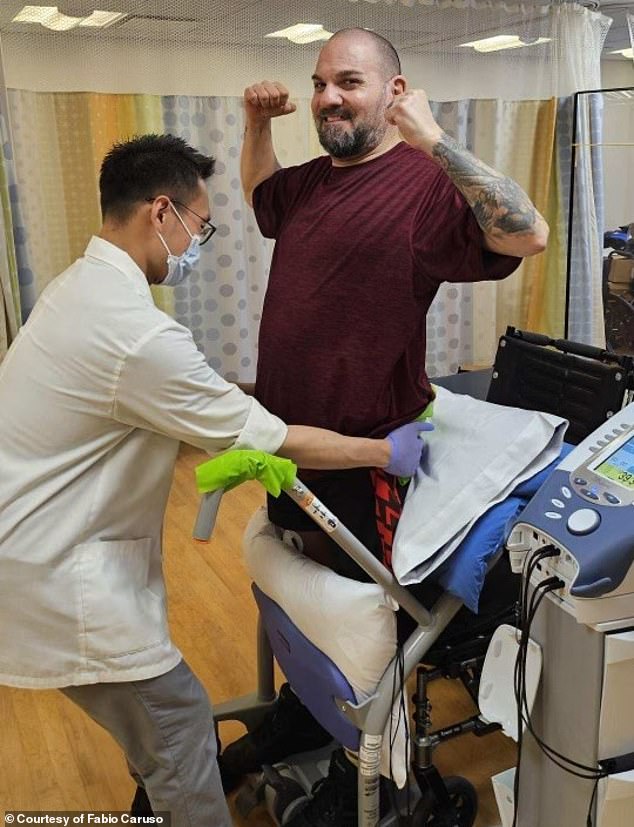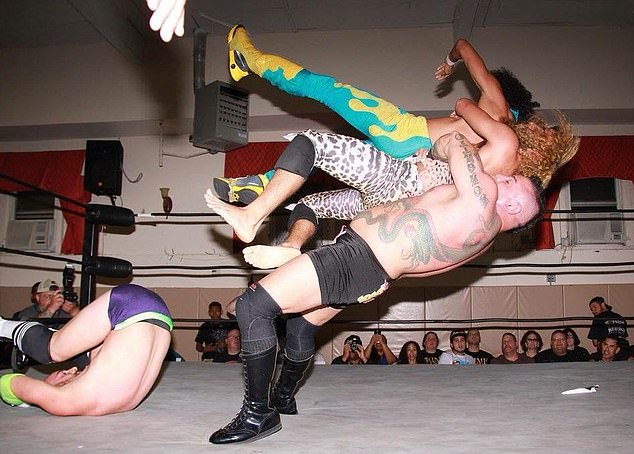Former wrestling champion was left paralyzed by amnesia after contracting the West Nile Virus
A former professional wrestling champion recently faced his most formidable competitor yet; a mosquito infected with the West Nile virus.
Fabio Caruso, 40, better known as The Sicilian Slammer in the ring, was working in his garden in Whitestone, New York, last September when he was bitten by a mosquito.
The wrestler was recovering from a kidney transplant at the time, which suppressed his immune system, causing the virus to quickly spread out of control in his body and develop into a serious infection.
When his condition worsened, Mr. Caruso was admitted to the intensive care unit at NYU Langone.
Respiratory failure and lower body paralysis left him unable to breathe on his own and he had to be placed on a ventilator to stay alive.
And due to the severity of his symptoms, the athlete suffered from high fever and memory loss for more than two months.
According to the CDC, individuals with certain medical conditions, such as cancer, diabetes, high blood pressure, kidney disease, and people who have undergone organ transplants, are at greater risk of serious health complications from West Nile virus because their immune systems are suppressed.
After more than ten months in the hospital, Mr. Caruso was well enough to be discharged and was admitted to the New Gouverneur Hospital Skilled Nursing Facility, where he underwent an intensive rehabilitation program for six months.
Fabio Caruso, 40, better known as The Sicilian Slammer in the ring, contracted the West Nile Virus, which left him paralyzed from the neck down

While recovering from a kidney transplant, his immune system became suppressed and the virus quickly developed into a serious infection.
The New Yorker said he was amazed at how a simple mosquito bite quickly turned his entire life upside down.
He remembers: ‘When I arrived at Gouverneur, I was still in a lot of pain and wondering why this was happening to me.
“I was discouraged and didn’t care about getting better.”
Despite his initial hesitation, Mr. Caruso soon realized the benefits of rehabilitation and getting his health back on track.
During his hospital stay, the former weightlifter and wrestler required 24-hour supportive support, including a motorized lift for bed transfers and assistance from two people for positioning.
Week after week, his strength improved and he used a standing aid to gain mobility and balance, while physical therapy helped reduce pain and improve his range of motion.
Mr Caruso’s wife, Irene, said his sporting background helped him during the recovery process.
She explained: ‘Fabio was always someone who took physical training very seriously, so he used his experiences in weightlifting and wrestling to bring that same motivation to rehabilitation.’
In July this year, he was finally discharged and allowed to return home to his wife and their daughter.

After his condition was stabilized, Mr. Caruso was admitted to New Gouverneur Hospital where he underwent an intensive rehabilitation program for six months.

Mr Caruso’s wife, Irene, said his sporting background helped him during the recovery process
When asked what contributed to his healing journey, Mr. Caruso said, “Aside from my faith, it was my wife and my seven-year-old daughter who encouraged me to get where I am today.
‘Things (also) improved when I started working with my occupational therapist Lina; within a month there was drastic improvement. Her work ethic is off the charts and she needs to be recognized.”
According to tHe Centers for Disease Control and Prevention (CDC), 1,240 human cases of West Nile virus have been reported in the U.S. so far this year.
This compares with 1,868 human cases of West Nile disease and 89 deaths during a severe outbreak in 2012, showing that efforts to contain the virus have paid off.
It usually takes between three and fourteen days for the disease to develop.
About 80 percent of infected people are asymptomatic (no symptoms), but about 20 percent develop a fever.
And each year in the U.S., about 1,000 people are hospitalized with the most severe form of the disease, which, if it spreads to the brain and nervous system, can cause brain swelling, brain damage and death, with a mortality rate of three to 15 percent.
People over 60 are at greater risk of serious illness if infected, as are people with certain medical conditions, such as cancer, diabetes, high blood pressure and kidney disease.
So far this year, there have been 886 severe or “neuroinvasive” cases of West Nile virus in the US.
There is no specific treatment for the virus or a vaccine, but 80 percent of cases are mild and patients may develop flu-like symptoms or a rash.
The CDC states that the best way to prevent West Nile is to protect yourself from mosquito bites.
Bite prevention tips include using insect repellents, wearing long-sleeved shirts and pants, and using mosquito repellent devices outdoors and around the home.
Larvicide can also be used to treat areas where mosquitoes can lay eggs.
